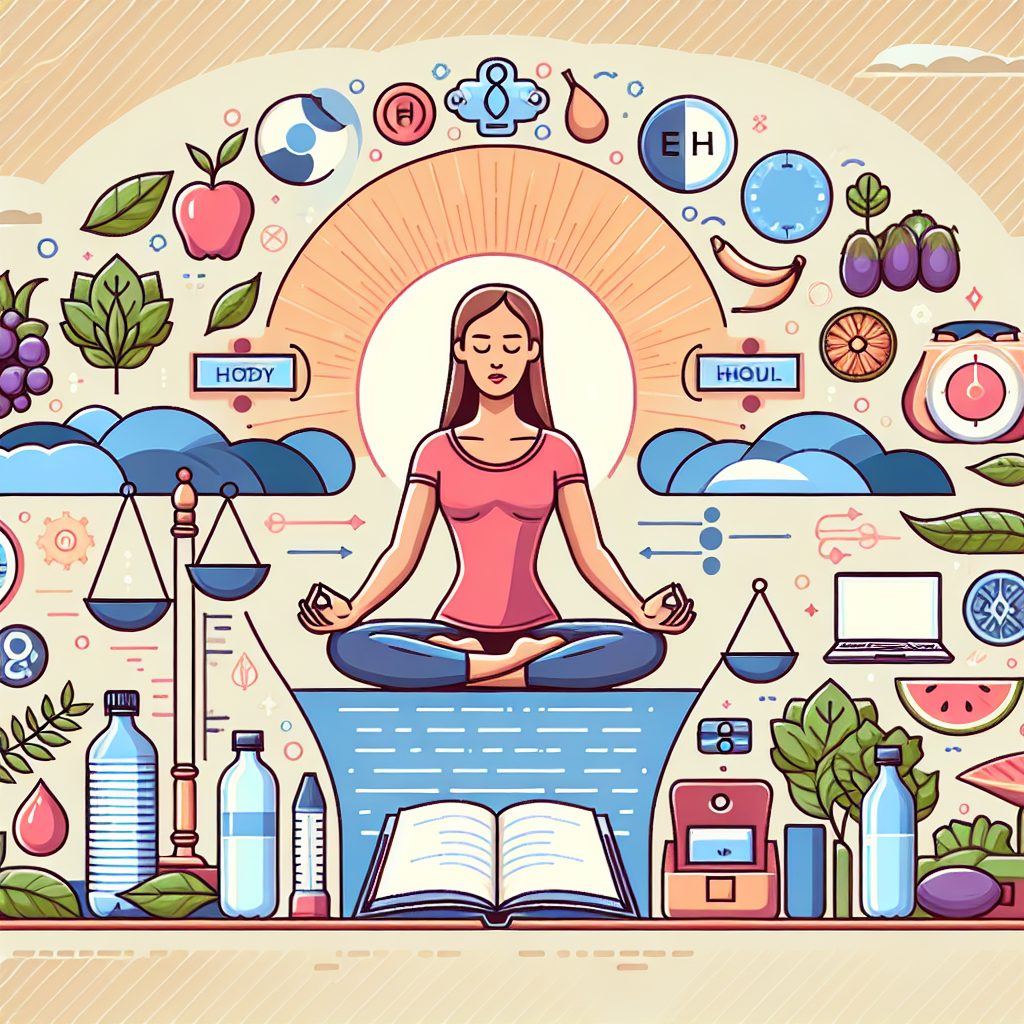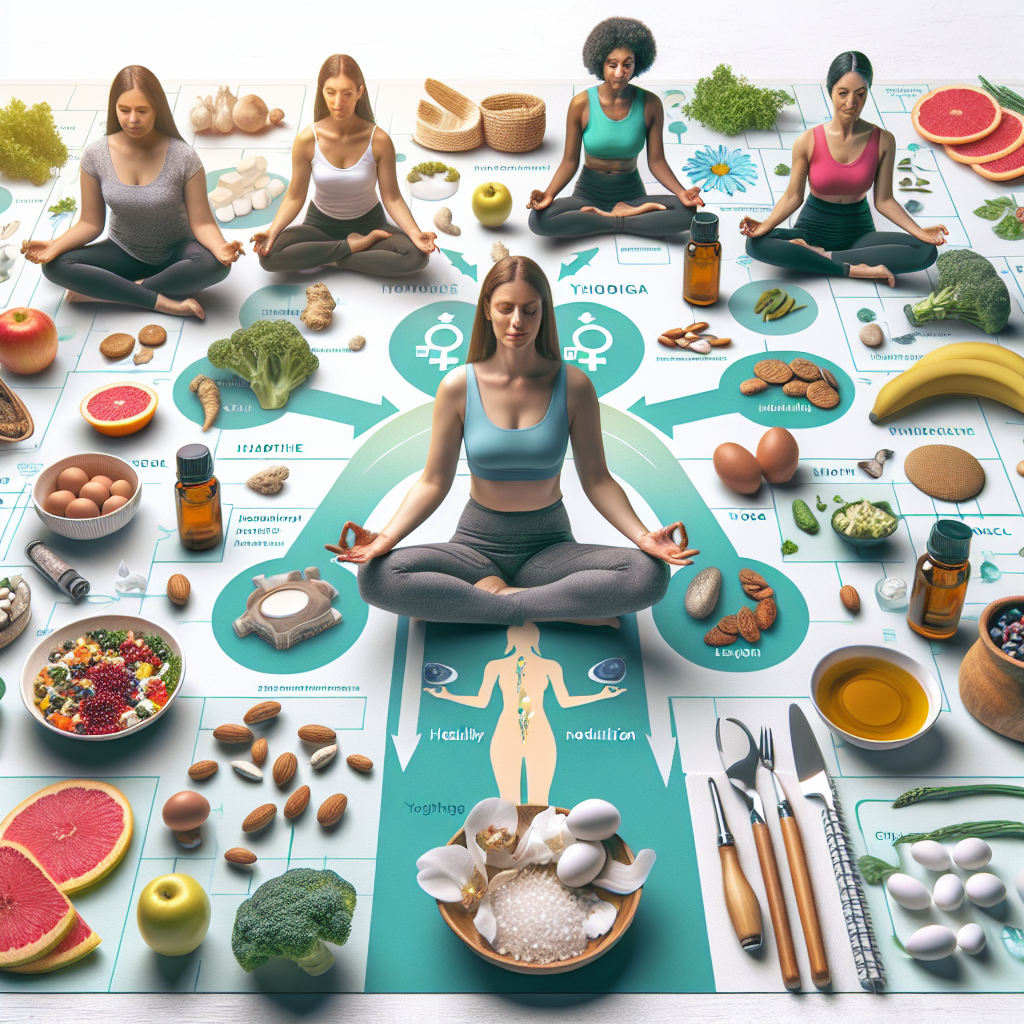How Women Can Naturally Achieve Hormonal Balance

Discover how to naturally achieve hormonal balance as a woman. Learn the secrets to a healthier, more balanced life. Visit My Vibrant Vitality now.
Exploring Natural Methods for Women to Balance Hormones
Hormonal balance is a crucial aspect of a woman’s health, affecting everything from mood to menstrual cycle, and from energy levels to overall well-being. However, due to various factors such as stress, poor diet, lack of exercise, and environmental toxins, hormonal imbalances have become increasingly common. Fortunately, there are natural methods that women can employ to restore hormonal equilibrium, promoting optimal health and vitality.
Firstly, a balanced diet plays a pivotal role in maintaining hormonal harmony. Consuming a variety of nutrient-dense foods can provide the body with the essential vitamins and minerals needed for hormone production and regulation. Foods rich in omega-3 fatty acids, such as fish and flaxseeds, can help reduce inflammation and balance hormones. Similarly, incorporating foods high in antioxidants, like fruits and vegetables, can combat oxidative stress, which is often linked to hormonal imbalances. Additionally, limiting intake of processed foods, sugars, and caffeine can prevent spikes and crashes in blood sugar levels, which can disrupt hormonal balance.
Secondly, regular physical activity is another natural method to balance hormones. Exercise not only helps to regulate insulin levels but also stimulates the production of hormones that promote feelings of happiness and relaxation, such as endorphins. Whether it’s a brisk walk, a yoga session, or a high-intensity interval training workout, incorporating regular exercise into your routine can significantly contribute to hormonal balance.
Thirdly, stress management is a critical component of hormonal balance. Chronic stress can wreak havoc on hormonal balance, leading to issues such as adrenal fatigue, thyroid problems, and irregular menstrual cycles. Techniques such as meditation, deep breathing exercises, and yoga can help manage stress levels, promoting a more balanced hormonal state.
Moreover, getting adequate sleep is essential for hormonal balance. During sleep, the body works to repair and regenerate cells and regulate hormones such as cortisol, the stress hormone, and leptin, the hormone that controls hunger and satiety. Therefore, ensuring you get a good night’s sleep can significantly contribute to maintaining hormonal balance.
Lastly, certain natural supplements can support hormonal balance. For instance, adaptogens, a class of herbs that includes ashwagandha and rhodiola, can help the body adapt to stress and support the adrenal glands. Probiotics can also promote hormonal balance by supporting gut health, which is closely linked to hormone regulation. However, it’s important to consult with a healthcare provider before starting any new supplement regimen.
In conclusion, achieving hormonal balance naturally is a multifaceted approach that involves a balanced diet, regular exercise, stress management, adequate sleep, and potentially the use of natural supplements. By implementing these strategies, women can promote hormonal balance, enhancing their overall health and well-being. It’s important to remember that while these methods can support hormonal balance, they are not a substitute for professional medical advice. If you suspect you have a hormonal imbalance, it’s crucial to consult with a healthcare provider to receive a proper diagnosis and treatment plan.
The Role of Diet and Exercise in Achieving Hormonal Balance for Women

Hormonal balance is a crucial aspect of a woman’s overall health. It influences everything from mood to menstrual cycle, and even the ability to conceive. When hormones are out of balance, it can lead to a host of health issues, including fatigue, weight gain, and mood swings. Fortunately, women can naturally achieve hormonal balance through diet and exercise.
The role of diet in achieving hormonal balance cannot be overstated. The food we consume has a direct impact on our hormone production. For instance, consuming a diet rich in lean proteins, fruits, vegetables, and whole grains can help maintain a healthy hormonal balance. These foods are packed with essential nutrients that our bodies need to produce hormones effectively.
On the other hand, consuming processed foods, sugary drinks, and excessive caffeine can disrupt hormonal balance. These foods can cause inflammation, which can interfere with hormone production. Moreover, they can lead to weight gain, which can further disrupt hormonal balance. Therefore, it is essential to maintain a healthy diet to achieve hormonal balance.
In addition to diet, exercise also plays a crucial role in achieving hormonal balance. Regular physical activity can help regulate hormones that control appetite, metabolism, sleep, and mood. For instance, exercise stimulates the production of endorphins, the body’s natural mood elevators. It also helps regulate insulin, a hormone that controls blood sugar levels.
Moreover, exercise can help manage stress, which is a common cause of hormonal imbalance. When we are stressed, our bodies produce more cortisol, a hormone that can disrupt other hormones. Regular exercise can help reduce stress levels and thus, help maintain hormonal balance.
However, it’s important to note that too much exercise can also disrupt hormonal balance. Over-exercising can put the body under stress, leading to an overproduction of cortisol. This can interfere with the production of other hormones, leading to hormonal imbalance. Therefore, it’s essential to find a balance and engage in moderate, regular exercise.
Incorporating strength training exercises into your routine can also be beneficial. Strength training can help balance hormones by reducing insulin resistance and boosting metabolism. This can help regulate blood sugar levels and prevent weight gain, both of which can help maintain hormonal balance.
In conclusion, achieving hormonal balance is not just about taking the right supplements or medications. It’s about leading a healthy lifestyle that includes a balanced diet and regular exercise. By consuming nutrient-rich foods and engaging in regular physical activity, women can naturally achieve hormonal balance. This can lead to improved mood, better sleep, and overall better health.
However, it’s important to remember that everyone’s body is different. What works for one person may not work for another. Therefore, it’s always a good idea to consult with a healthcare provider before making any major changes to your diet or exercise routine. They can provide personalized advice based on your specific needs and health conditions.
In the end, achieving hormonal balance is a journey, not a destination. It requires consistent effort and lifestyle changes. But the rewards – improved health, better mood, and overall well-being – are well worth the effort.
Understanding the Connection Between Lifestyle Changes and Hormonal Balance in Women
Hormonal balance is a crucial aspect of a woman’s health, affecting everything from mood to menstrual cycle, and from energy levels to overall well-being. However, many women experience hormonal imbalances due to various factors such as stress, poor diet, lack of exercise, and environmental toxins. Fortunately, there are natural ways to achieve hormonal balance, and they primarily involve making certain lifestyle changes.
Understanding the connection between lifestyle changes and hormonal balance in women is the first step towards achieving a healthier, more balanced life. Hormones are chemical messengers that regulate most of our body’s major processes, including metabolism, mood, and reproduction. When these hormones are out of balance, it can lead to a host of health issues, including weight gain, mood swings, fatigue, and fertility problems.
One of the most effective ways to naturally balance hormones is through diet. Consuming a balanced diet rich in lean proteins, fruits, vegetables, whole grains, and healthy fats can help regulate hormone production. Certain foods, such as those high in omega-3 fatty acids like fish and flaxseeds, can help reduce inflammation and balance hormones. On the other hand, foods high in sugar and processed carbohydrates can cause insulin levels to spike, leading to hormonal imbalances.
Exercise is another crucial factor in maintaining hormonal balance. Regular physical activity can help regulate insulin levels, reduce stress, and promote better sleep, all of which can help balance hormones. It’s important to choose a form of exercise that you enjoy and can maintain consistently, whether it’s walking, yoga, swimming, or weightlifting.
Stress management is also essential in achieving hormonal balance. Chronic stress can wreak havoc on your hormones, leading to imbalances that can affect your physical and mental health. Techniques such as meditation, deep breathing exercises, and yoga can help manage stress levels and promote hormonal balance.
Sleep is another often overlooked but vital factor in hormonal balance. Lack of sleep can disrupt the production of hormones, leading to imbalances. Aim for seven to nine hours of quality sleep per night to allow your body to rest and regenerate.
Lastly, reducing exposure to environmental toxins can also help balance hormones. Many everyday products, such as plastic containers, cleaning products, and cosmetics, contain endocrine-disrupting chemicals that can interfere with hormone production. Opting for natural, non-toxic products can help reduce your exposure to these harmful chemicals.
In conclusion, achieving hormonal balance naturally is a multifaceted approach that involves making significant lifestyle changes. A balanced diet, regular exercise, stress management, adequate sleep, and reducing exposure to environmental toxins are all key components of this approach. It’s important to remember that these changes may take time to show results, and it’s always advisable to consult with a healthcare professional before making any major changes to your lifestyle or diet. By understanding the connection between lifestyle changes and hormonal balance, women can take proactive steps towards achieving a healthier, more balanced life.